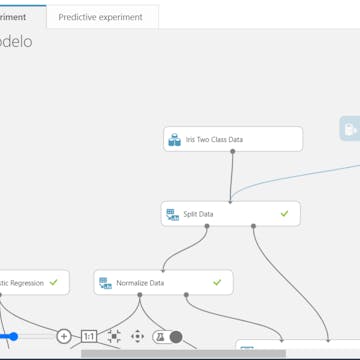
Good to know
Save this course
Reviews summary
Helpful intro to azure machine learning studio
Activities
Review linear algebra and calculus
Show steps
Ensures a solid understanding of mathematical concepts essential for machine learning.
Browse courses on
Linear Algebra
Show steps
-
Review key topics
-
Solve practice problems
-
Complete online quizzes
Review cloud computing concepts
Show steps
Provides a strong foundation in cloud computing concepts and prepares you for the course's hands-on activities.
View
Cloud Computing: Concepts, Technology &...
on Amazon
Show steps
-
Read chapters 1-3
-
Summarize key concepts
-
Complete practice exercises
Follow online tutorials on Azure Machine Learning Studio
Show steps
Provides additional support and guidance for using Azure Machine Learning Studio, supplementing the course's lessons.
Show steps
-
Identify relevant tutorials
-
Follow the steps and instructions
-
Practice and apply what you learn
Four other activities
Expand to see all activities and additional details
Show all seven activities
Practice building models in Azure Machine Learning Studio
Show steps
Develops practical skills in using Azure Machine Learning Studio, reinforcing the course's concepts.
Show steps
-
Create a new project
-
Import and prepare data
-
Train and evaluate models
-
Deploy and monitor models
Join or form a study group with other course participants
Show steps
Fosters collaboration, knowledge sharing, and peer support, promoting deeper understanding and retention.
Show steps
-
Find or create a study group
-
Schedule regular meetings
-
Discuss course topics
-
Share resources and insights
Create a blog post or article on machine learning
Show steps
Enhances understanding and retention by requiring you to explain machine learning concepts to others.
Show steps
-
Choose a topic
-
Research and gather information
-
Write and edit content
-
Publish and promote
Attend industry workshops or conferences on machine learning
Show steps
Exposes you to cutting-edge trends and practices in machine learning, broadening your knowledge and industry connections.
Show steps
-
Identify relevant events
-
Register and attend
-
Network with professionals
-
Learn about latest advancements
Review linear algebra and calculus
Show steps
Ensures a solid understanding of mathematical concepts essential for machine learning.
Browse courses on
Linear Algebra
Show steps
- Review key topics
- Solve practice problems
- Complete online quizzes
Review cloud computing concepts
Show steps
Provides a strong foundation in cloud computing concepts and prepares you for the course's hands-on activities.
View
Cloud Computing: Concepts, Technology &...
on Amazon
Show steps
- Read chapters 1-3
- Summarize key concepts
- Complete practice exercises
Follow online tutorials on Azure Machine Learning Studio
Show steps
Provides additional support and guidance for using Azure Machine Learning Studio, supplementing the course's lessons.
Show steps
- Identify relevant tutorials
- Follow the steps and instructions
- Practice and apply what you learn
Practice building models in Azure Machine Learning Studio
Show steps
Develops practical skills in using Azure Machine Learning Studio, reinforcing the course's concepts.
Show steps
- Create a new project
- Import and prepare data
- Train and evaluate models
- Deploy and monitor models
Join or form a study group with other course participants
Show steps
Fosters collaboration, knowledge sharing, and peer support, promoting deeper understanding and retention.
Show steps
- Find or create a study group
- Schedule regular meetings
- Discuss course topics
- Share resources and insights
Create a blog post or article on machine learning
Show steps
Enhances understanding and retention by requiring you to explain machine learning concepts to others.
Show steps
- Choose a topic
- Research and gather information
- Write and edit content
- Publish and promote
Attend industry workshops or conferences on machine learning
Show steps
Exposes you to cutting-edge trends and practices in machine learning, broadening your knowledge and industry connections.
Show steps
- Identify relevant events
- Register and attend
- Network with professionals
- Learn about latest advancements
Career center
Data Scientist
Machine Learning Engineer
Data Analyst
Business Analyst
Software Engineer
Product Manager
Financial Analyst
Marketing Manager
Sales Manager
Operations Manager
Human Resources Manager
Project Manager
Consultant
Teacher
Writer
Reading list
Share
Similar courses
OpenCourser helps millions of learners each year. People visit us to learn workspace skills, ace their exams, and nurture their curiosity.
Our extensive catalog contains over 50,000 courses and twice as many books. Browse by search, by topic, or even by career interests. We'll match you to the right resources quickly.
Find this site helpful? Tell a friend about us.
We're supported by our community of learners. When you purchase or subscribe to courses and programs or purchase books, we may earn a commission from our partners.
Your purchases help us maintain our catalog and keep our servers humming without ads.
Thank you for supporting OpenCourser.



